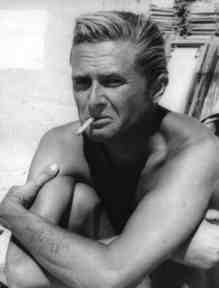A while ago a friend sent me a clipping from The Guardian, an article by Zoe Williams about my beloved Polish author Marek Hlasko. Somehow the article slipped through my fingers, but this afternoon I read it while sitting next to my mother. Williams’ article is an intelligent and honest attempt to explain why Hlasko’s novella “The Eight Day of The Week” is still so appealing, even with all its obvious weaknesses.
Williams writes:
“This is another interesting thing about The Eighth Day of the Week, the issue of what it meant that books like this were banned – how it changed the cultural landscape and the history it left behind. Because, while this novel was, naturally, profoundly, critical of life under communism, it also has poignant and loving things to say about life in Warsaw, the hopeless but not nihilistic poetry of its drunk young generation. All of that was lost when Hlasko was exiled, the beauty as well as the squalor.
But most of all, it left me with a possibly perverse optimism, in the way it underlined the universality of anomie. For my whole reading life, it's been fashionable to blame consumerism and/or western self-involvement for the questions that don't have answers: where does individualism become alienation? How much community does a person need? How much could a person take? What have we lost? Where would we look if we wanted to recover it? What's the point of it all?
In fact, these are questions that everybody without faith asks themselves, all the time – and maybe consuming and competing are meaningless, but they are not the cause of this restlessness.
Hlasko died in West Germany, at the age of 35. The critic Jerzy Kosinksi said he died "of an overdose of solitude and not enough love". In fact it was sleeping pills, but you get what he means.”
(Read the complete article here.)
Williams has a point, consumerism is not the cause of alienation. I’m not even sure if alienation is such a terrible thing.
After the age of 25 or so we don’t want to know what the point is of it all. After a certain age, life becomes mandatory. Unless you rebel against the commitments of bourgeois life, as Hlasko tried to do. He rebelled against the commitments of communism as well of course.
(Please, keep in mind that I also admire Deirdre McCloskey, so for me “bourgeois” is not a pejorative term.)
